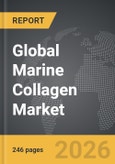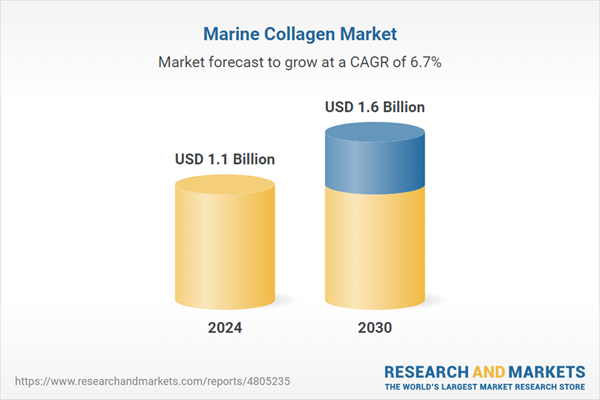Global Marine Collagen Market - Key Trends & Drivers Summarized
What Is Marine Collagen and Why Is It Gaining Popularity in the Health and Beauty Sectors?
Marine collagen is a type of collagen derived from the skin, scales, and bones of fish and other marine life. Collagen, a protein that provides structural support to skin, bones, and connective tissue, is highly valued for its potential health and beauty benefits. Marine collagen, in particular, has gained significant attention in recent years due to its bioavailability - meaning it is absorbed more easily by the human body compared to other collagen sources like bovine or porcine collagen. Its smaller peptide size makes it a preferred ingredient in supplements, skincare products, and functional foods, catering to consumers looking for natural solutions to improve skin elasticity, joint health, and overall vitality. The growing consumer focus on anti-aging products and natural health solutions has propelled marine collagen into the mainstream, particularly in beauty and wellness markets.How Is Marine Collagen Being Used Across Various Industries?
Marine collagen's applications extend beyond supplements and beauty products, as it is increasingly being used in food, beverage, and pharmaceutical industries. In the beauty sector, marine collagen is widely used in creams, serums, and facial masks for its reputed ability to improve skin hydration, reduce wrinkles, and promote skin regeneration. In the dietary supplement market, it is consumed in the form of powders, capsules, and drinks that claim to support joint health, hair growth, and skin repair. Furthermore, marine collagen is making its way into functional foods, where it is added to protein bars, beverages, and health snacks aimed at boosting daily protein intake without adding calories or fat. The pharmaceutical industry is also exploring marine collagen for its potential wound healing properties and its role in tissue engineering, as it has shown promise in helping regenerate skin, cartilage, and bone.What Challenges Does the Marine Collagen Market Face?
Despite its rising popularity, the marine collagen market faces several challenges, particularly regarding sourcing, production costs, and regulatory issues. Sourcing marine collagen can be resource-intensive, as it is typically derived from fish byproducts, such as skin and scales, which need to be processed efficiently to meet the rising demand. This can raise sustainability concerns, especially if overfishing or environmentally harmful extraction methods are employed. Additionally, the production process for high-quality marine collagen is complex and requires sophisticated technology, which can drive up costs. Another challenge lies in consumer awareness and education - many consumers are still unfamiliar with the differences between marine collagen and other collagen types, and the efficacy of these products. Regulatory challenges also arise, as marine collagen is often used in nutraceuticals and cosmetics, where standards can vary significantly by region, requiring manufacturers to navigate differing compliance rules.Growth in the Marine Collagen Market Is Driven by Several Factors
The growth in the marine collagen market is driven by several factors, including advancements in extraction and production technology, increasing consumer demand for natural and sustainable beauty and health products, and the expanding application of collagen in the food and pharmaceutical industries. Technological innovations have made it easier to extract high-quality collagen peptides from marine sources, allowing manufacturers to scale production and meet the growing demand. Additionally, the consumer shift toward clean-label, natural ingredients in skincare and dietary supplements is fueling the demand for marine collagen, as it is perceived to be a more sustainable and eco-friendly alternative to animal-derived collagens. The rising awareness of the potential health benefits of collagen in improving skin, joint, and bone health is also driving its adoption in the functional food and beverage markets. These factors, along with the growing exploration of marine collagen's therapeutic uses in pharmaceuticals, are expected to contribute to the robust growth of the global marine collagen market.Report Scope
The report analyzes the Marine Collagen market, presented in terms of market value (USD). The analysis covers the key segments and geographic regions outlined below.- Segments: Type (Type I, Type II, Type III); Application (Nutraceuticals, Cosmetics, Medical, Other Applications).
- Geographic Regions/Countries: World; United States; Canada; Japan; China; Europe (France; Germany; Italy; United Kingdom; Spain; Russia; and Rest of Europe); Asia-Pacific (Australia; India; South Korea; and Rest of Asia-Pacific); Latin America (Argentina; Brazil; Mexico; and Rest of Latin America); Middle East (Iran; Israel; Saudi Arabia; United Arab Emirates; and Rest of Middle East); and Africa.
Key Insights:
- Market Growth: Understand the significant growth trajectory of the Type I Collagen segment, which is expected to reach US$1.1 Billion by 2030 with a CAGR of 7.2%. The Type II Collagen segment is also set to grow at 6.2% CAGR over the analysis period.
- Regional Analysis: Gain insights into the U.S. market, valued at $281.4 Million in 2024, and China, forecasted to grow at an impressive 10.1% CAGR to reach $383.2 Million by 2030. Discover growth trends in other key regions, including Japan, Canada, Germany, and the Asia-Pacific.
Why You Should Buy This Report:
- Detailed Market Analysis: Access a thorough analysis of the Global Marine Collagen Market, covering all major geographic regions and market segments.
- Competitive Insights: Get an overview of the competitive landscape, including the market presence of major players across different geographies.
- Future Trends and Drivers: Understand the key trends and drivers shaping the future of the Global Marine Collagen Market.
- Actionable Insights: Benefit from actionable insights that can help you identify new revenue opportunities and make strategic business decisions.
Key Questions Answered:
- How is the Global Marine Collagen Market expected to evolve by 2030?
- What are the main drivers and restraints affecting the market?
- Which market segments will grow the most over the forecast period?
- How will market shares for different regions and segments change by 2030?
- Who are the leading players in the market, and what are their prospects?
Report Features:
- Comprehensive Market Data: Independent analysis of annual sales and market forecasts in US$ Million from 2024 to 2030.
- In-Depth Regional Analysis: Detailed insights into key markets, including the U.S., China, Japan, Canada, Europe, Asia-Pacific, Latin America, Middle East, and Africa.
- Company Profiles: Coverage of players such as Amicogen, Inc., Ashland, Inc., BDF Natural Ingredients, S.L., China Deyuan Marine Fitting Co., Ltd., Connoils LLC and more.
- Complimentary Updates: Receive free report updates for one year to keep you informed of the latest market developments.
Some of the 46 companies featured in this Marine Collagen market report include:
- Amicogen, Inc.
- Ashland, Inc.
- BDF Natural Ingredients, S.L.
- China Deyuan Marine Fitting Co., Ltd.
- Connoils LLC
- Darling Ingredients, Inc.
- Exclusive Mark (M) Sdn Bhd
- Gelita AG
- GMN Healthcare Pvt. Ltd.
- Grant Industries, Inc.
This edition integrates the latest global trade and economic shifts into comprehensive market analysis. Key updates include:
- Tariff and Trade Impact: Insights into global tariff negotiations across 180+ countries, with analysis of supply chain turbulence, sourcing disruptions, and geographic realignment. Special focus on 2025 as a pivotal year for trade tensions, including updated perspectives on the Trump-era tariffs.
- Adjusted Forecasts and Analytics: Revised global and regional market forecasts through 2030, incorporating tariff effects, economic uncertainty, and structural changes in globalization. Includes historical analysis from 2015 to 2023.
- Strategic Market Dynamics: Evaluation of revised market prospects, regional outlooks, and key economic indicators such as population and urbanization trends.
- Innovation & Technology Trends: Latest developments in product and process innovation, emerging technologies, and key industry drivers shaping the competitive landscape.
- Competitive Intelligence: Updated global market share estimates for 2025, competitive positioning of major players (Strong/Active/Niche/Trivial), and refined focus on leading global brands and core players.
- Expert Insight & Commentary: Strategic analysis from economists, trade experts, and domain specialists to contextualize market shifts and identify emerging opportunities.
Table of Contents
Companies Mentioned (Partial List)
A selection of companies mentioned in this report includes, but is not limited to:
- Amicogen, Inc.
- Ashland, Inc.
- BDF Natural Ingredients, S.L.
- China Deyuan Marine Fitting Co., Ltd.
- Connoils LLC
- Darling Ingredients, Inc.
- Exclusive Mark (M) Sdn Bhd
- Gelita AG
- GMN Healthcare Pvt. Ltd.
- Grant Industries, Inc.
Table Information
| Report Attribute | Details |
|---|---|
| No. of Pages | 246 |
| Published | February 2026 |
| Forecast Period | 2024 - 2030 |
| Estimated Market Value ( USD | $ 1.1 Billion |
| Forecasted Market Value ( USD | $ 1.6 Billion |
| Compound Annual Growth Rate | 6.7% |
| Regions Covered | Global |









